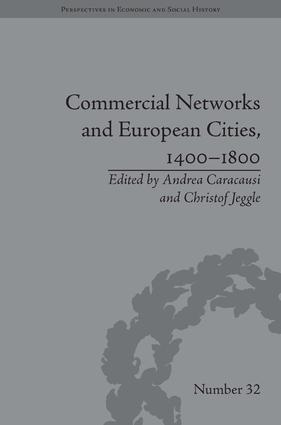Merchant networks generated trade and the exchange of goods between the cities of early modern Europe. Such networks were fundamental in the spread of cultural artefacts and practice, as well as leading to migration between the cities. This collection of essays applies network analysis to commercial networks, focusing on the roles of kinship, origin, religion and business in creating and maintaining urban economies.
Introduction – Andrea Caracausi and Christof Jeggle
Part I: Approaches
1 Networks as Social Structures in Late Medieval and Early Modern Towns: A Theoretical Approach to Historical Network Analysis – Mike Burkhardt
2 Interactions, Networks, Discourses and Markets – Christof Jeggle
Part II: Merchants
3 Creating Networks through Languages: Italian Merchants in Late Medieval and Early Modern Europe – Francesco Guidi-Bruscoli
4 Networks and Commercial Penetration Models in the Late Medieval Mediterranean: Revisiting the Datini – Angela Orlandi
5 Networks and Merchant Diasporas: Florentine Bankers in Lyon and Antwerp in the Sixteenth Century – Heinrich Lang
6 The Astudillo Partnership and the Spanish ‘Nation’ in Sixteenth-Century Florence – Francesco Ammannati and Blanca González Talavera
Part III: Markets and Institutions
7 Merchant Networks in the Cities of the Crown of Castile – David Carvajal de la Vega
8 Galley Routes and Merchant Networks between Venice and the North Sea in the Fifteenth Century – Stefania Montemezzo
9 Network Takers or Network Makers? The Portuguese Traders in the Medieval West – Flávio Miranda
Part IV: Products
10 Pepper and Silver between Milan and Lisbon in the Second Half of the Sixteenth Century – Benedetta Crivelli
11 The Wool Trade, Venice and the Mediterranean Cities at the End of the Sixteenth Century – Andrea Caracausi
12 The Scerimans and Cross-Cultural Trade in Gems: The Armenian Diaspora in Venice and its Trading Networks in the First Half of the Eighteenth Century – Evelyn Korsch
Notes
Index

